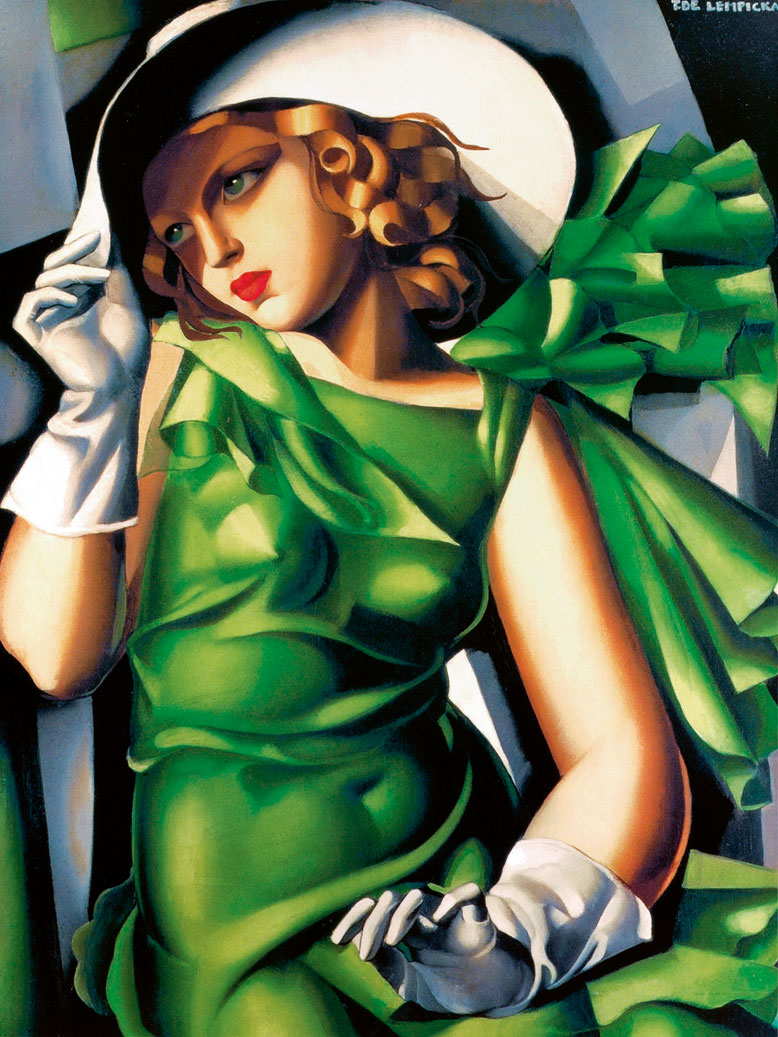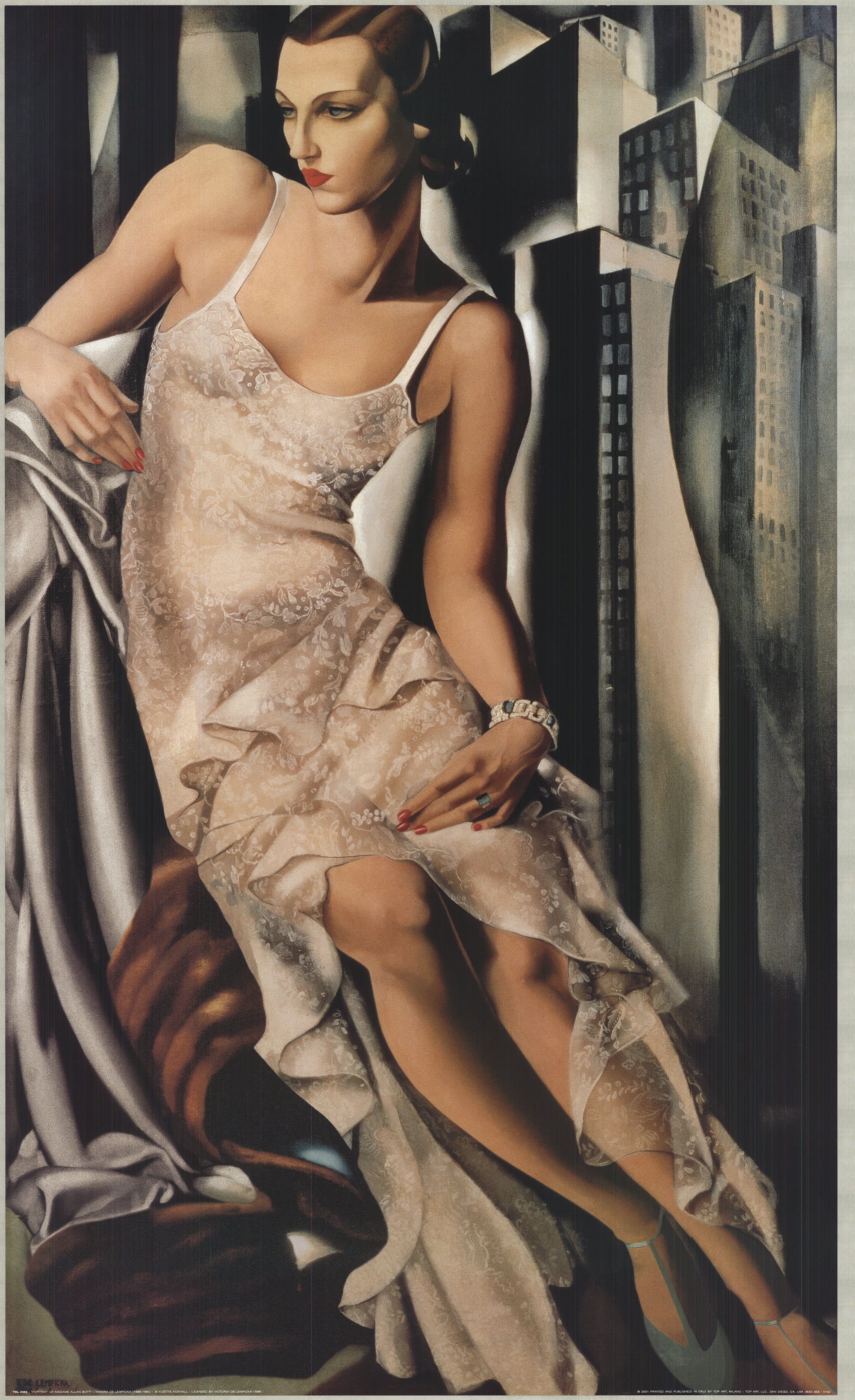
Tamara de Lempicka Die goldenen Zwanzigerjahre der Tamara de Lempicka ZEIT ONLINE
Private collection. Adam and Eve is a 1932 oil-on-panel painting by the Polish painter Tamara de Lempicka. It is in the Art Deco style and depicts a male nude embracing a female nude who holds an apple. In the background are stylized skyscrapers. The painting is 116 by 73 centimetres (46 by 29 in), and is housed in a private collection.

Nadja Meihack, Kopie Tamara de Lempicka, Portrait Madame Ira Perrot (1930), 2015, Öl auf
Adam and Eve. Limited Inventory. Price upon request. Please e-mail: [email protected]. A sensual new image of a classical subject. "Adam and Eve" is Tamara de Lempicka's original creation. No other artist has approached the subject so directly and so skillfully. "Adam and Eve" bears the hypnotic elegance of a fine Renaissance.

MuseARTa TAMARA DE LEMPICKA ADAM UND EVA Zoknik mehrfarbig/többszínű Zalando.hu
Georges Braque. French 1900-2000. Follow. From ArtWise, Tamara de Lempicka, Adam et Eve (2001), Offset Lithograph, 39 1/2 × 23 3/4 in.

Tamara De Lempicka Santa Teresa d’Avila, 1930 St Theresa Of Avila, Saint Teresa, Tamara
Adam and Eve is a 1932 oil-on-panel painting by the Polish painter Tamara de Lempicka. It is in the Art Deco style and depicts a male nude embracing a female nude who holds an apple. In the background are stylized skyscrapers. The painting is 116 by 73 centimeters, and is housed in a private collection.

Tamara de Lempicka Female artists, Portrait, Art deco fashion
Adam and Eve is an oil on panel painting by a Polish Art Deco painter Tamara de Lempicka. It was completed in 1932 and is a religious subject based on the Art Deco style. The painting is 116 by 73 centimeters, and is housed in a private collection. Lempicka was fond of repeating certain interesting stories about the creation of Adam and Eve.

The Green Turban by Tamara de Lempicka, oil on canvas, 1930 TheGreenTurban TamaraDeLempicka
1932. Type. Oil on panel. Dimensions. 116 cm × 73 cm (46 in × 29 in) Adam and Eve (Italian: Adamo ed Eva) is an oil on panel painting by a Polish Art Deco painter Tamara de Lempicka. It was completed in 1932 and is a religious subject based on the Art Deco style. The painting is 116 by 73 centimeters, and is housed in a private collection.

Un pomeriggio alla mostra di TAMARA DE LEMPICKA, la baronessa pittrice(24 maggio 2015) Amici
View Adam and Eve (1898 - 1980) After Tamara de Lempicka; oil on board; board, 128 x 78cm, ; Edition. Access more artwork lots and estimated & realized auction prices on MutualArt.. Recent Lots by Tamara de Lempicka. Female Nude - Tamara de Lempicka Toovey's; YOUNG LADY WITH GLOVES - Tamara de Lempicka Cordy's; TEMARA LEMPICKA PRINT.

Adam And Eve Tamara Lempicka Art, Adam, eve, Painting prints
Tamara De Lempicka: The Queen of the Modern (2011) by Gioia Mori. The authoritative collection on the first female artist to achieve celebrity. Tamara de Lempicka, global painter, and star of the art deco-style produced paintings that became icons of a period, the "crazy" 1920s and 1930s.

17 Best images about Art Deco on Pinterest Monuments, Empire state building and 30 rockefeller
Tamara de Lempicka was born Maria Gorska in Warsaw, Poland, in 1898. Introduced to art at the age of 12, her mother had paid for an established painter to create her daughter's portrait. Unsatisfied with the results and convinced that she could do better herself, de Lempicka set out on a task that would subsequently carve out a successful, if.

Tamara de Lempicka Young Ladies (1927) r/museum
Summary of Tamara de Lempicka. Tamara de Lempicka was the lone traditional easel painter in the entirety of the Art Deco style. Her sources of inspiration ranged dramatically: she adored Italian Renaissance painting; she was characterized by critics as a sort of modern-day Ingres, although the comparisons were more often not intended to flatter.

Tamara de Lempicka Purum! Art deco paintings, Art deco posters, Art deco fashion
Adam and Eve, 1932 by Tamara de Lempicka. Get the museum-quality Giclée Canvas Print 4424 from TopArtPrint. Experience the iconic masterpiece.. Tamara de Lempicka Original Size:100 x 65 cm Private Collection. About TopArtPrint. Our area of expertise lies in creating museum-quality giclée art prints on canvas and fine art paper.
.jpg)
Tamara de Lempicka Aktuelle Auktionen, Wertentwicklung und kostenlose Kunstpreisanalysen
Browse Getty Images' premium collection of high-quality, authentic Adam And Eve (Tamara De Lempicka) stock photos, royalty-free images, and pictures. Adam And Eve (Tamara De Lempicka) stock photos are available in a variety of sizes and formats to fit your needs.

TAMARA DE LEMPICKA Portrait de Madame Allan Bott 39.5" x 23.75" Offset Lithograph 2001
Give good old Wikipedia a great new look. Adam and Eve is a 1932 oil-on-panel painting by the Polish painter Tamara de Lempicka. It is in the Art Deco style and depicts a male nude embracing a female nude who holds an apple. In the background are stylized skyscrapers. The painting is 116 by 73 centimetres , and is housed in a private collection.

Pin en Arte
Adam and Eve (Italian Adamo ed Eva) is an oil on panel painting by a Polish Art Deco painter Tamara de Lempicka. It was completed in 1932 and is a religious subject based on the Art Deco style. The painting is 116 by 73 centimeters, and is housed in a private collection. Lempicka was fond of repeat

Image result for adam and eve tamara de lempicka Art deco paintings, Art deco artists, Art
Adam and Eve (Tamara de Lempicka) Adam and Eve is a 1932 oil-on-panel painting by the Polish painter Tamara de Lempicka. It is in the Art Deco style and depicts a male nude embracing a female nude who holds an apple. In the background are stylized skyscrapers. The painting is 116 by 73 centimetres (46 by 29 in), and is housed in a private.

Tamara Lémpicka E S T I L O / Online
Tamara de Lempicka was the lone traditional easel painter in the entirety of the Art Deco style. Her sources of inspiration ranged dramatically: she adored Italian Renaissance painting; she was characterized by critics as a sort of modern-day Ingres, although the comparisons were more often not intended to flatter; she absorbed the avant-garde art of the era - particularly post-cubist.